Obituary: Sir David Frost
- Published
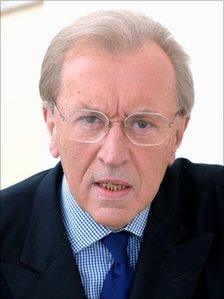
His interviewees were a roll-call of the great, the good and the not so good
Sir David Frost was a household name, a man who became a broadcasting legend on both sides of the Atlantic.
He began his career at the cutting edge of television satire and went on to interview some of the most famous people of his generation, becoming friends with many of them on the way.
He developed the confrontational style dubbed "trial by television" although, in later years, his interviews lost something of their cutting edge.
David Paradine Frost was born in Tenterden in Kent on 7 April 1939, the son of a Methodist minister.
The young David did set out on a course of training to become a local preacher before abandoning the idea.
He also turned down the offer of professional terms with Nottingham Forest and went to Cambridge University where he read English and edited the university magazine, Granta.
A look back at the life of Sir David Frost
More importantly he became secretary of the Footlights Dramatic Club where he met future comedy stars such as Eleanor Bron, Peter Cook, John Bird and Graham Chapman.
During his time as an undergraduate, he also made a few appearances on regional television, and later noted: "The first time I stepped into a television studio it felt like home.
"It didn't scare me. Talking to the camera seemed the most natural thing in the world".
That Was The Week That Was
After leaving Cambridge he worked as a trainee for the London ITV franchisee Associated Rediffusion before moving to a job at another ITV company, Anglia Television.
In 1962, the writer and producer Ned Sherrin approached Frost to host a new satirical television programme being planned by the BBC, That Was The Week That Was.
TW3, as it became known, gleefully lampooned the British establishment and tapped into the changing perception the public had of politicians in the wake of the Profumo scandal.
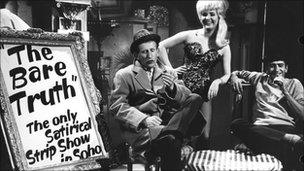
Ground-breaking satire on TW3
The programme struck a chord with a nation that had, until then, been naturally deferential towards its leaders.
No target was safe, with politicians, business leaders and religion being just some of the subjects that came under the TW3 microscope.
Frost's sardonic presentational style was coupled with an acerbic script from a team of writers which included John Bird, Peter Cook, John Cleese, Keith Waterhouse and Dennis Potter.
TW3 also broke all the technical rules of television. Cameras and other equipment appeared in shot and the programme, broadcast live on a Saturday night, would often over- or under-run depending on how much material was available on the night.
Politicians regularly complained to BBC management that they were being ridiculed by David Frost and his team. But the programme gained a massive following and soon achieved cult status.
Trial by television
The BBC finally dropped the programme in 1964 over concern that it would unduly influence voters in that year's general election.
Frost was back a year later fronting another Sherrin production, Not So Much A Programme, More A Way Of Life. The show was not as successful as TW3 and was dropped after just one series.
Sherrin later noted that "David always learns from his mistakes without ever actually admitting that he's made any".
Frost said the observation was "amazingly true, actually... because I do analyse what I do and try and improve it, and I don't share that with anybody."
His next series, The Frost Report, brought together John Cleese, Ronnie Barker and Ronnie Corbett, notably in the famous class sketch, ran for 29 episodes and featured scripts written by some of the best comedy writers of their generation.
It inarguably set the tone of British comedy for the next decade, launching the careers of the The Two Ronnies, The Monty Python team and The Goodies.
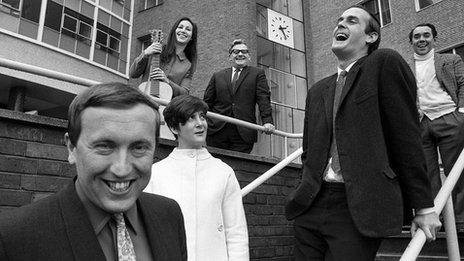
The star-making team on the Frost Report
By now Frost had developed his catchphrase, "hello, good evening and welcome", which was to become much mimicked.
After the Frost Report he moved back to Rediffusion where he fronted The Frost Programme, a series of in-depth interviews with leading figures from the worlds of politics and entertainment.
Interviewees included The Beatles, Mick Jagger, Orson Welles, Tennessee Williams and Noel Coward, while Prince Charles was interviewed on the eve of his investiture as Prince of Wales.
In 1967 Frost interviewed the notorious fraudster, Emil Savundra, whose string of failed insurance companies left thousands of his clients without cover or their money.
Savundra, who was obviously expecting an easy ride, was taken aback by the force of Frost's questioning and the presenter became increasingly frustrated by his guest's evasive manner.
The Frost Programme was the first current affairs programme to use a participating audience and Frost was roundly applauded as he stormed off the set, still visibly angry at Savundra.
The conduct of the interview caused some concern among TV executives, but it blazed a path for the far more aggressive style of interviewing that would be adopted in the future by journalists such as Jeremy Paxman and John Humphrys.
For his part, Frost said his rise was more about luck than judgment.
"There was enormous luck in being young in that period, 1956-63," he told The Independent in 1993. "In the 60s, everything was exploding. There obviously is an interaction between one's time and one's life. But partly one was a child of the time and partly one was trying to take the argument ahead.
"Not 17 steps ahead, because no one would be there, but one step ahead. That Was The Week... probably did articulate the kind of rebellion and resentment people were feeling, but articulated it maybe one year ahead.''
The Nixon interviews
By the 1970s, Frost was well known in America, having begun hosting The David Frost show on US television in 1969.
In 1977, he used his probing style to take US President Richard Nixon to task over his role in the Watergate affair.
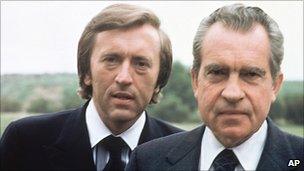
His interviews with Richard Nixon shed new light on Watergate
In the interviews, watched by 45 million people, Nixon ultimately admitted his part in the scandal which led to his resignation two years earlier.
"He was the most fascinating man," Frost later told CNN.
"I mean, an enigma. There's never been anyone who was such an enigma in the Oval Office. Someone has to be pretty fascinating, pretty enigmatic, pretty Nixonian to keep one fascinated for 28¾ hours."
The story of their verbal battle was brought to a new generation with the 2008 release of Frost/Nixon - a film based on those interviews, starring Michael Sheen as the British contender and an Oscar-nominated Frank Langella as the disgraced politician.
Breakfast with Frost
Frost was a joint founder of London Weekend Television and one of the famous five presenters-cum-shareholders behind breakfast television station TV-am, which launched in 1983.
The show saw his interview style soften, although he still retained the capacity to throw in mischievously leftfield questions.
"Have you ever felt the presence of God in a room?" he asked then-Prime Minister Margaret Thatcher in 1985. She considered for a while, then responded that whatever she said on that topic, the answer would be misinterpreted.
But his Sunday morning show was a ratings hit, and by 1992 it was reported that TV-AM paid him £368,000 a year - or £9,000 per episode.
Throughout the 1990s he hosted the panel game Through the Keyhole, in which contestants had to guess the identity of a celebrity after watching a video tour of their home.
Produced by Frost's own company, and featuring appearances by Lloyd Grossman, it originally aired on ITV before transferring to the BBC in 1997.
When GMTV won ITV's breakfast franchise in 1992, it was made clear that Frost, who had submitted a rival bid, would no longer be welcome.
The BBC pounced, and signed him up to present Breakfast with Frost, his first regular weekly show for the corporation since That Was The Week That Was.
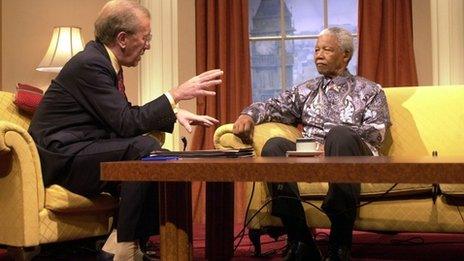
Sir David interviewed Nelson Mandela in 2001
His new show - also on a Sunday morning - ran for 500 editions, ending in May 2005 when he switched to presenting a weekly current affairs programme Frost All Over The World on the Al Jazeera English Channel.
His interviewees included former Prime Minister Gordon Brown and former US Republican presidential candidate John McCain.
By this time the angry young satirist had metamorphosed into comfortable middle age and become part of the very establishment he had lampooned so effectively 30 years before.
Many critics derided his new interviewing style, suggesting it should be more properly called Bedtime With Frost; but he was unabashed.
"What is more likely to get the coat off your back: The wind or the sun? Wind makes you draw the jacket round yourself. The sun encourages you to take it off," he said.
Frost wrote a number of books, produced eight films and received many major TV awards, in the UK and internationally.
He was appointed OBE in 1970, and knighted in 1992. "It's the most wonderful surprise that I have ever had," he said at the time.
"Thoughts of honour didn't enter my mind when I started out in the business at 23."
He was the only journalist to have interviewed all seven British prime ministers who held office between 1964 and 2010 and every US president who had occupied the White House between 1969 and 2008.
His asked almost all of them the same question: "What would you like the first line of your obituary to be? What would you like to be remembered for?"
And he knew exactly how he would answer.
"John Smith said to me, 'You have a way of asking beguiling questions with potentially lethal consequences.'
"I would be content to have that on my tombstone."